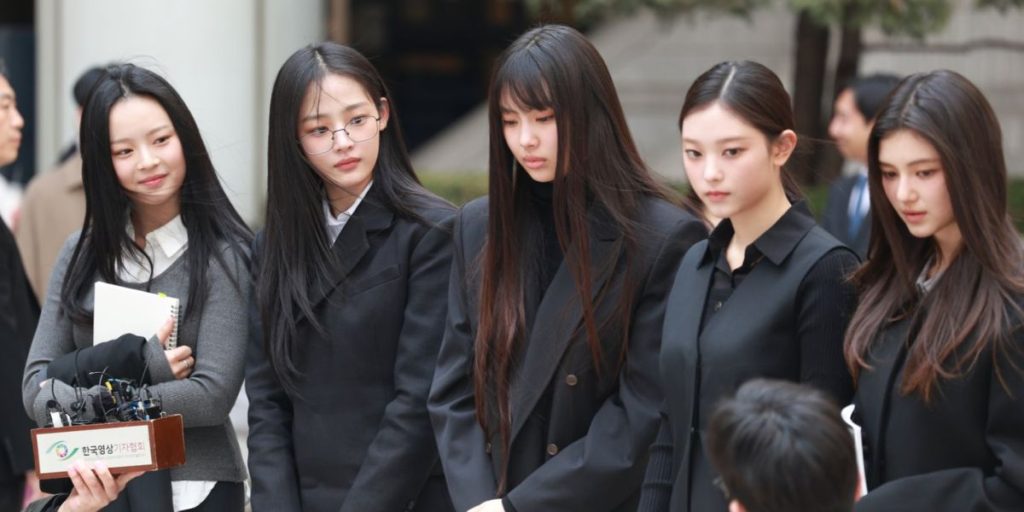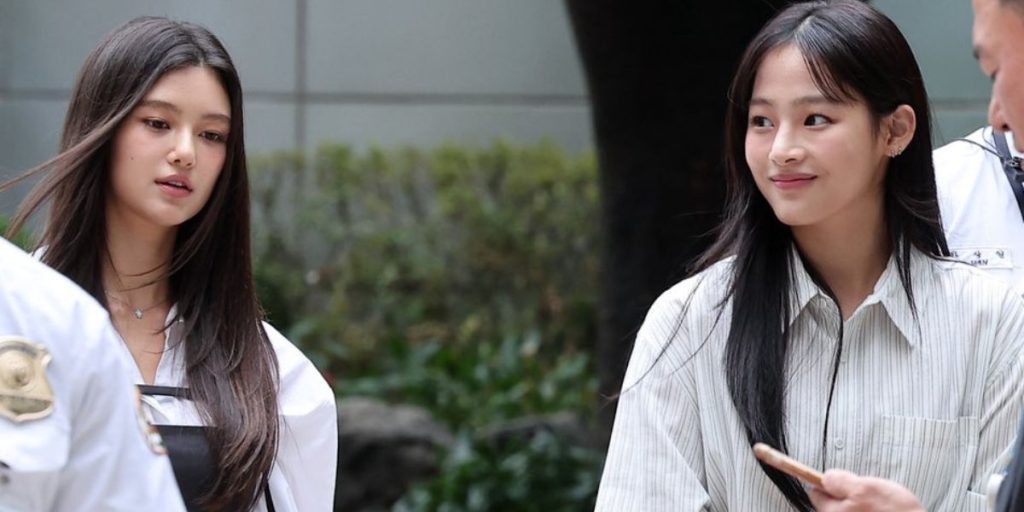The relationship between K-pop idols and their management companies is often opaque, with disputes rarely breaking into the public eye. Yet the bitter conflict between HYBE, South Korea’s largest entertainment powerhouse, and its subsidiary ADOR over the management of NewJeans (later rebranded as NJZ) has unfolded in full view of fans and the media.
NewJeans—Minji, Hanni, Danielle, Haerin, and Hyein—rose to stardom rapidly after their 2022 debut. But by 2024, accusations of discrimination, unfair treatment, and corporate sabotage shook their relationship with HYBE. Was HYBE truly unjust to NewJeans, or did the group receive unprecedented backing from the company? The reality is far more complex.
The Allegations of Discrimination and Mistreatment Made by NewJeans
NewJeans accused HYBE and ADOR executives of discriminatory practices that undermined their careers. Their representatives cited incidents where HYBE allegedly prioritized other groups like LE SSERAFIM and ILLIT at NewJeans’ expense.
- Media manipulation: The group alleged that HYBE engaged in “large-scale media-play” that downplayed their success while elevating other groups.
- ILLIT controversy: The launch of ILLIT sparked anger among NewJeans’ supporters, who accused HYBE of copying NewJeans’ aesthetic and diluting their brand.
- Endorsement interference: When Hyein was tapped as a luxury brand ambassador for LV, HYBE reportedly pressured the company to also name LE SSERAFIM members as ambassadors, without consulting NewJeans’ team.
- Debut Delay: One of the biggest issues raised by former ADOR CEO Min Hee Jin was the debut delay during the press conference after the audit. Min was told by executives that NewJeans would debut as HYBE’s first girl group. However, the honor went to LE SSERAFIM, which debuted around three months before NewJeans.
The members also described hostile treatment within the company. They alleged that Bang Si Hyuk and other executives ignored them, and that staff were told not to engage with them. In one symbolic moment, Minji revealed HYBE discouraged them from wearing memorial ribbons honoring victims of the December 2024 Jeju Air crash.
The most serious charges came from Hanni’s testimony before the National Assembly in October 2024. She spoke of harassment and neglect, declaring, “We are all human.” Although her petition for labor protections was rejected—since idols are not legally categorized as workers—it amplified concerns about artist welfare in K-pop.
By late 2024, the group livestreamed an emotional plea for HYBE to reinstate Min Hee Jin as ADOR’s CEO. In November, they attempted to unilaterally terminate their contracts, citing broken trust and lack of protection.
HYBE and ADOR’s Defense
HYBE and ADOR rejected claims of discrimination, pointing instead to the extraordinary level of investment and support NewJeans received.
- Financial commitment: HYBE invested 21 billion KRW (about $15 million) into NewJeans’ debut—five times more than LE SSERAFIM (nearly $3 million), who debuted the same year.
- Revenue success: NewJeans generated around 100 billion KRW ($73 million) in revenue in 2023, making them one of HYBE’s most profitable groups.
- Generous settlements: Each member received 5 billion KRW ($3.5 million) in settlements by 2023, with ADOR emphasizing this was evidence of fair compensation, not neglect.
Beyond money, the group enjoyed privileges few others had:
- Phoning app: Unlike other HYBE acts tied to Weverse, NewJeans used their own app, Phoning, built with significant resources.
- Private styling room: By their second year, the group was given a permanent styling room at HYBE’s Yongsan building, whereas other artists continued sharing common spaces.
- International stages: They performed at major events historically associated with BTS—Summer Sonic, Lollapalooza, and Rockin’ Eve—becoming only the third HYBE act after BTS and TXT to do so.
- Appearance in BTS’ Music Video: Before their debut, Minji and Hanni even appeared in BTS’s 2021 music video Permission to Dance, which signaled HYBE’s early effort to link them with its biggest act.
- No Promotional Neglect: HYBE publicly addressed accusations of promotional neglect, stating they issued 273 press releases promoting NewJeans. These are far more compared to BTS and SEVENTEEN, including 659 for BTS-related units and 365 for SEVENTEEN’s divisions.
- International Music Producers – HYBE hired the best music producers for NewJeans, who have worked with global pop stars. In the plan for the full album and fan meeting revealed during the injunction lawsuits, Bang Si Hyuk was trying to connect Mark Ronson, Grammy-winning music producer behind Bruno Mars’ ‘Uptown Funk,’ with NewJeans. Because of his high demand, bookings usually take around 1.5 years, but Bang was using his resources to speed up the collaboration.
HYBE also argued that from a business standpoint, it made little sense to discriminate against one of their most bankable groups.

The “BTS Comparison” Incident
A revealing episode highlighted how far ADOR went to promote NewJeans. HYBE traditionally forbids comparing junior groups with BTS or any other artists to avoid fan wars and internal tension. However, in March 2023, ADOR’s vice president insisted on issuing a press release noting that NewJeans’ “Ditto” surpassed BTS’s “Dynamite” in daily No. 1 rankings on Melon.
Despite objections from HYBE’s PR team, the phrase was included, leading to headlines like “NewJeans Surpasses BTS.” This broke a long-standing internal taboo, and HYBE later cited it as proof that ADOR gave NewJeans preferential marketing treatment rather than holding them back.
The phrase led to intense fan wars and massive backlash from ARMYs, and Bang Si Hyuk faced intense scrutiny at the time.
Legal Battles and Market Fallout
By late 2024, the conflict had escalated into lawsuits and injunctions.
- Contract termination attempt: On November 28 last year, NewJeans declared they were ending their contracts early, citing mistreatment. HYBE rejected this, noting their contracts were valid until 2029.
- Court ruling: In early 2025, a court sided with ADOR, blocking NewJeans (now NJZ) from pursuing independent activities without ADOR’s approval.
- Market impact: News of the group’s attempted exit caused HYBE’s market valuation to drop by more than $420 million.
The group later said they might return to ADOR, but only if Min Hee Jin were reinstated and working conditions restored to their pre-audit state. At the third hearing in July, the group representatives shared that some members had begun taking antidepressants during the dispute. While NewJeans’ lawsuit is ongoing, Min Hee Jin won a major parallel lawsuit against HYBE, and the court cleared her of breach of trust charges.
Industry Context and Fan Divisions
The dispute underscored larger issues in K-pop: power imbalances, lack of artist protections, and the tension between creative freedom and corporate control. Hanni herself remarked on this, noting that companies often view idols as “products rather than human beings.”
Yet the evidence of heavy investment and special treatment complicates claims of systemic neglect. Online communities like Theqoo and Nate reflected this divide. Some argued NewJeans exaggerated their struggles despite enjoying “princess treatment,” while others believed their courage to speak out shed light on industry-wide problems.
Mocking terms like “HYBoongie” emerged, used by critics who saw NewJeans as ungrateful juniors capitalizing on victim narratives while enjoying privileges other groups never had.
May believed that they were collateral damage in Min Hee Jin’s conflict against HYBE. Some even go as far as claiming she used the girls to get a one-up on HYBE at the expense of their flourishing careers.

Was HYBE Unfair to NewJeans?
So, was HYBE unfair to NewJeans? The answer depends on perspective. On one hand, NewJeans’ testimonies of harassment, creative interference, and endorsement meddling reveal real concerns. Their willingness to confront HYBE publicly was a rare act of defiance that forced conversations about artist rights in K-pop.
On the other hand, the financial data and tangible perks show that NewJeans were among HYBE’s most supported acts. Far from being sidelined, they were granted investment, exposure, and marketing advantages many peers never received.
Ultimately, the dispute was less about resources and more about control, autonomy, and trust. For NewJeans, support without respect felt hollow. For HYBE, the group’s success story was evidence of its commitment.
In other news, after a failed first mediation session, NewJeans will hold talks again with ADOR on September 11. If no agreement is reached beforehand, the court is scheduled to deliver its ruling on NewJeans’ future with ADOR on October 30.

